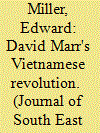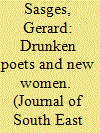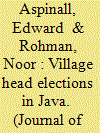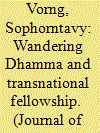|
|
|
Sort Order |
|
|
|
Items / Page
|
|
|
|
|
|
|
| Srl | Item |
| 1 |
ID:
151660


|
|
|
|
|
| Summary/Abstract |
During the fall of 1962, the American war correspondent Richard Tregaskis spent three months in South Vietnam. In Vietnam diary, published the following year, Tregaskis offered vivid descriptions of his experiences, which included joining South Vietnamese army troops on combat missions against ‘Viet Cong’ fighters, as well as observing an election inside one of the Saigon government's newly built ‘strategic hamlets’. But the main purpose of Vietnam diary was to detail the author's many encounters with Americans in South Vietnam — specifically the US soldiers, marines, and other military personnel serving as advisers to the South Vietnamese Army. Tregaskis greatly admired these Americans, whom he portrayed as indomitable Cold Warriors. He was particularly impressed with Lieutenant Dave Marr, a Marine intelligence officer he met at a US base in the city of Da Nang. Lt Marr, whom Tregaskis described as a ‘slim blond youth’ from California, spoke excellent Vietnamese, thanks to a year of intensive language training. He also displayed a marked ‘enthusiasm for things Vietnamese’. Tregaskis noted that Marr was rather less optimistic than many of his peers about the prospects for success against the communist enemy. ‘The best you can say is that we're holding our own,’ the marine told the journalist.
|
|
|
|
|
|
|
|
|
|
|
|
|
|
|
|
| 2 |
ID:
151654


|
|
|
|
|
| Summary/Abstract |
This article uses the lens of alcohol as a means of exploring the experiences and anxieties of Vietnamese ‘colonial modernity’ and the way it was mutually constituted with ‘colonial tradition’. The production, consumption, and meaning of alcohol in Vietnam were all profoundly altered as the state's contested attempts to control the market for rice liquor interacted with the growing availability of imports like wine, champagne, and cognac. While these new products would become ideal symbols of modernity and markers of distinction, at the same time reinvented traditions surrounding what the French called ‘native’ and the Vietnamese called ‘our’ alcohol would become linked to evolving notions of community and nation.
|
|
|
|
|
|
|
|
|
|
|
|
|
|
|
|
| 3 |
ID:
151657


|
|
|
|
|
| Summary/Abstract |
Most studies on diversity in Southeast Asia focus on the nation-state, with much less attention given to everyday encounters and the negotiation of diversity in local contexts. This article investigates the discourses and practices of various actors in the historically tolerant, generally peaceful, and diverse city and special region of Yogyakarta, Indonesia. This study examines this ethnic, religious and cultural diversity and illustrates the negotiations among various interest groups and actors that strive to maintain this balance, or sometimes to strategically disrupt it. As such, the findings offer a different way to understand and interrogate the challenges confronting present-day diversity both on a local level in Yogyakarta, and also for Indonesia and Southeast Asia at large.
|
|
|
|
|
|
|
|
|
|
|
|
|
|
|
|
| 4 |
ID:
151658


|
|
|
|
|
| Summary/Abstract |
Quezon City was founded in 1939 as a planned city and envisioned as the future capital of the Philippines, which was anticipating its independence in a few years. Led by President Manuel Quezon, Philippine politicians conferred upon the city narratives of nationhood and social justice to make it the best spatial representation of a nation-in-waiting. However, underneath these state-centric ideologies was the authoritarianism of the Quezon regime, which used urban politics to centralise power. But far from being a symbol of the President's undisputed dominance, Quezon City's inherent contradictions became weak points in the city's official narrative.
|
|
|
|
|
|
|
|
|
|
|
|
|
|
|
|
| 5 |
ID:
151655


|
|
|
|
|
| Summary/Abstract |
To explore how democratisation is transforming Indonesia's rural elite, we examine two village head elections in Central Java. Despite the competitiveness of these elections, the campaigning modes employed by candidates, especially vote buying, points to elite continuity, because only wealthy villagers can compete for office. Moreover, links with higher state officials remain important for village elites, allowing them to win political support by obtaining projects from local government. However, rather than being incorporated as subordinates in a bureaucratic hierarchy as during authoritarian rule, village elites are now true rural brokers, exercising considerable leverage in their relations with the state.
|
|
|
|
|
|
|
|
|
|
|
|
|
|
|
|
| 6 |
ID:
151659


|
|
|
|
|
| Summary/Abstract |
This article compares Buddhist and Christian approaches to the drug problem among ethnic minorities in northern Thailand. Government programmes implemented through Buddhist monasteries aim to construct Buddhist subjects and realise agendas of national security in border areas. Yet, they also offer development support and access to resources. Meanwhile, gospel rehabilitation centres provide much-needed drug treatment services while drawing highlanders into transnational spheres of Christian fellowship. Consequently, I argue that the relationship between ethnic minorities and the state can be defined in terms of aspiration and negotiation, as well as resistance and evasion, as has been previously argued in the literature.
|
|
|
|
|
|
|
|
|
|
|
|
|
|
|
|
| 7 |
ID:
151656


|
|
|
|
|
| Summary/Abstract |
During Timor-Leste's political and security crisis in 2006, a seemingly latent regional division re-emerged between Timorese from its eastern region, lorosa'e, and those from its western region, loromonu. The conflict between lorosa'e and loromonu revealed critical weaknesses in nation-building. Only four years after independence in 2002, international peacekeeping forces, led by Australia, were redeployed to the new nation-state. This article argues that the enduring political significance of regionalism weakens nation-building in Timor-Leste. This case study revitalises traditional security paradigms by relocating identity-building from the periphery of nation-building to its centre. Identity-building supports the formation of a unifying national political community which transcends social divisions within post-conflict societies.
|
|
|
|
|
|
|
|
|
|
|
|
|
|
|
|
|
|
|
|
|